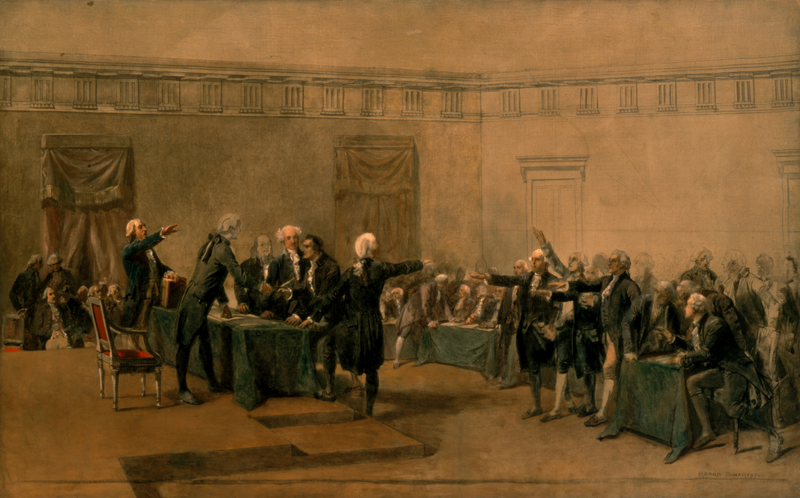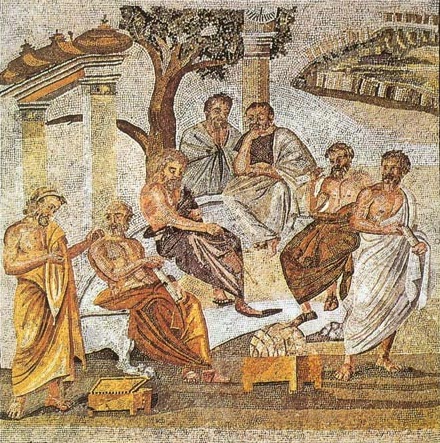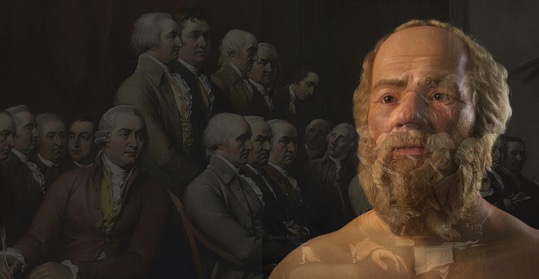Ethics and Metaphysics at Princeton in 1750s-60s
Here’s a taste of what you had to be able to argue (in Latin) in order to graduate from Princeton in order to graduate back in the day.
Robby George would (no doubt gladly!) find himself the leebearal on campus…
ETHICS, 1762
1. The highest perfection of men depends on their liberation from all sin.
2. Truths that are known of themselves [self-evident] exist in ethics.
3. Therefore, Moral truths can be demonstrated equally with mathematical truths.
4. Ethical ideas are for the most part more complex than numbers; therefore Ethics is more difficult to prove than mathematics.
6. Absolute liberty belongs to no form of government.
11. The moral sense in so far as it is a simple perception and the foundation of moral obligation does not exist.
12. The present life is to be estimated not as an end but in so far as it provides an opportunity for the securing of eternal happiness.
20. The idea of virtue is definite and also immutable.
A ruler endowed with civil virtue though without military glory is much preferable to a prince who though without civil virtue is very illustrious for his courage in war.
ETHICS, 1760
A perfect system of ethics in the present condition of men cannot be constructed without the help of divine revelation,
3. The propensity of nature toward moral evil even when vehement does not do away with responsibility.
4. Mere speculation in matters of prudence without experience and observation is not sufficient to direct men well.
5. Actions which are materially good can be at the same time formally bad.
6. A rational being acting according to reason cannot do evil.
7. The obligation of an intelligent being is increased or diminished according to the strength of nature and the opportunity of action.
8. The evil of a sin is to be estimated from the quality of the delinquent and the dignity of the personality who is affected by the injury.
9. In the state of nature a man is the owner of all that he secured possession of before others.
10. The number of each sex is throughout all the centuries nearly equal; therefore
11. Polygamy is not in accordance with reason nor does it belong to the institution of God as Creator and Providence.
15. Human society cannot exist without the observance of truth.
16. The faculty of distinguishing good from evil is essential to a moral agent.
17. The liberty of a creature may crave the faculty of performing an action but does not require it.
22. Moral obligation supposes reason and the congruence of things, but
23. God is the cause of things and therefore also of the relations of the same; hence
24. God is the cause and the exemplar of reason and of the congruence of things.
25. The moral sense is only indeed a mode of perceiving moral obligation.
26. In all men there is present a moral sense of eternal obligation as is plainly to be seen from the judgments which men make with regard to the actions of others.
27. Parents in accordance with their condition in life are bound to imbue the minds of their children with doctrine (education).
28. A clement, mild government conduces very much to the increase of the number of subjects and of rendering them obedient to the laws.
29. To be affected by a sense of the Deity and of His Providence is the greatest incitement that we have to the practice of virtue.
METAPHYSICS, 1752
The science which treats of the abstract relations and causes of things.
1. The essences of mathematical entities (abstract ideas) are immutable.
2. Whatever consists of parts cannot be infinite.
3. A simple being insofar as it is such is prior to and more perfect than one that is a compound.
4. All the essences of things existed in the mind of God from eternity.
5. The possibility of a thing is deduced from the non-repugnance of the (notes constituting the) idea.
6. Cyclogenesis (the genesis of living beings in a cycle, that is each from the other without any beginning) is impossible; therefore
7. The existence of God can be demonstrated from effect to cause.
8. All the divine ideas are wanting in archetypes.
9. Moral evil does not take away the perfection of this world.
METAPHYSICS, 1750
Metaphysics treats of beings considered abstractly in themselves and of their causes, kinds and relationships.
1. A series of causes cannot proceed to infinity.
2. Metaphysical truth in perfection (certitude) does not admit degree.
3. The moral perfections of God are not exercised from natural necessity.
4. Physical possibility can exist apart from moral possibility.
5. All things by the necessity of consequences are necessary,
6. But this necessity has no influence over the will of moral agents.
7. A conscious succession of thought is not necessary to constitute personal identity.
The American Mind presents a range of perspectives. Views are writers’ own and do not necessarily represent those of The Claremont Institute.
The American Mind is a publication of the Claremont Institute, a non-profit 501(c)(3) organization, dedicated to restoring the principles of the American Founding to their rightful, preeminent authority in our national life. Interested in supporting our work? Gifts to the Claremont Institute are tax-deductible.
On campus, today's forlorn meritocrats no longer believe what the apparatchiks are teaching them.
Libertarianism again fails natural right.
Every nation is shaped by its canon. It’s time to shape America’s.






